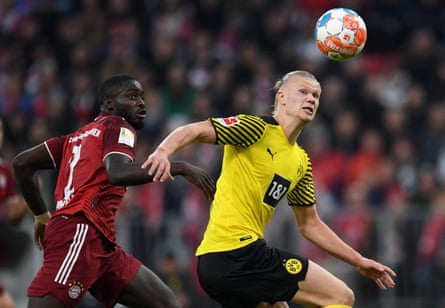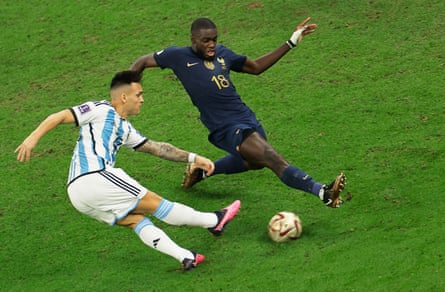“Today I’m proud because I’ve progressed a lot,” Dayot Upamecano says as he reflects on finding his voice and overcoming the fear that rippled through him when he had to speak up at school. The Bayern Munich centre-back, an important figure for France during their run to the final of the 2022 World Cup, was eight when he first experienced problems with his speech and he has not forgotten the taunts that would fly in his direction during childhood.
“I was very scared,” Upamecano admits on a still afternoon at Clairefontaine, France’s celebrated training centre. “When you have a stammer as a kid you’re scared to talk because people will make fun of you. It’s difficult to distance yourself from it. You say to yourself all the time: ‘If I talk people will make fun.’ You don’t want to go up to the blackboard, or communicate in general, because you know people will be mocking you.”
Upamecano, who is preparing to take on Erling Haaland when Thomas Tuchel’s Bayern visit Manchester City in the first leg of their Champions League quarter-final on Tuesday, does not shy away from telling his story. The 24-year-old does not carry with him the pain of those challenging early moments. He was fortunate to be surrounded by a good support network. He has four sisters – two older, two younger – and they always had Upamecano’s back.
“They supported me,” he says. “Always telling me to talk despite my speech impediment, even if people were making fun. They told me that I would eventually see that the people who mocked me would be the ones applauding me. The most important thing was for me to talk. But it was hard. They weren’t in my situation as I was the only one with a stutter. In the end, though, I managed to distance myself from the mockery and take the advice that my family gave me.”
Upamecano, who grew up in Evreux, a commune in Normandy, stayed strong. He soon had help from a speech therapist but there were complications. The sessions stopped after the family moved home. “Then my parents divorced,” Upamecano says. “I started therapy again when I was 15.”
There was no psychological reason behind the stammer. “I think it was maybe because I would try and talk too fast,” Upamecano says. And the problem gradually faded. Playing football for his local side was the release for Upamecano, who is warm, thoughtful company. “The thing that helped me most was being on the pitch. As a defender I was obliged to speak. It was your role to see the game, to see all the players, so there was no choice.
“The coach made me captain, which gave me a lot of confidence. I was obliged to communicate with my teammates. I felt good on the pitch. No one made fun of me there. I didn’t stutter when I was playing.”
Upamecano, who counted the France and Barcelona winger Ousmane Dembélé as a childhood friend, stood out from the pack. He joined Valenciennes’ academy in 2013 and stayed for two years before moving to RB Salzburg. The Austrian club had seen Upamecano’s strength, speed, reading of the game and ability on the ball.
Yet the plaudits have never gone to Upamecano’s head. “I was a good boy,” he says. “I worked from an early age, helping my mother at the market stall. She sold hair extensions for Afro hairstyles. I was 13. There were heavy boxes to carry and I helped setting up the stall.
“I also watched out for thieves. My mother was alone and I felt I had to protect her. I didn’t like the idea of her being in the cold and dark by herself. We started early, around 5.30 in the morning. I didn’t like staying in bed knowing that my mother was out working. If ever I was late to help her, I would run. Sometimes I played on Sundays, so after the match I would run to go and help her.”
Is Upamecano aware of how much pressure he was putting on himself? “It was completely natural,” he says. “It didn’t even cross my mind. It was just important that I help my mother. Whenever she offered me money for helping I would say no.
“This has made me who I am today. And my mum is proud of me. Today I’m the same – I’m always listening to any advice that’s given. I have a personal sports coach, a private chef – it helps me to improve. The most important thing is to remain in good shape. And to win trophies.”

Upamecano is starting to build his collection of medals. He progressed after joining Salzburg – “I was scared about moving abroad but my family said I would kill it,” he says – and honed his game in Austria. “I learned to defend standing up,” Upamecano says. “I’m not saying I don’t like or don’t know how to tackle. It’s just that if you can defend standing up it’s better in a duel. When you tackle you have to be sure. It’s a very precise movement and it can be very dangerous. I try to stay on my feet.”
That smooth approach earned Upamecano a reputation as one of the best young defenders in the world after he joined RB Leipzig in 2017. He adapted to the Bundesliga, developing thanks to Julian Nagelsmann’s coaching, and was courted by several elite clubs.
after newsletter promotion
Upamecano was hot property. He made his France debut in 2020 and, despite interest from the Premier League, joined Bayern in 2021. He won the Bundesliga in his debut campaign but this season has been harder. Borussia Dortmund have challenged at the top of the league and there was shock when Bayern sacked Nagelsmann last month.
In came Thomas Tuchel, and in his first game Bayern crushed Dortmund 4-2. The old authority returned. Upamecano, who is developing an understanding with Matthijs de Ligt in central defence, is ready to face Pep Guardiola’s City. “They have a great coach and a great team,” he says. “But we’re FC Bayern. We will do everything to beat them.”
Upamecano is respectful of Haaland but he will draw on stopping his France teammate Kylian Mbappé when Bayern beat Paris Saint-Germain in the last 16. Not that it was easy. Upamecano is not about to pretend that he can beat Mbappé for pace.
“It’s much easier to have him in your team,” he says. “You have to always be well balanced, ready to move in any direction; to be vigilant, watching his positioning on the pitch and also his body language. He is the best player in the world – he is extraordinary.”
Upamecano had a good view of Mbappé taking the World Cup by storm. But the striker’s hat-trick in the final was not enough for France to defend their crown. Upamecano, who started alongside Raphaël Varane, remains rueful about losing to Argentina on penalties. “It was my first World Cup and it was unforgettable,” he says. “We were so close to winning.”

It was an incredible game. France looked dead and buried when 2-0 down at half-time but Didier Deschamps managed to motivate his players. “We knew we had played badly in the first half,” Upamecano says. “But the coach said: ‘It’s a World Cup final, you have to give everything.’ We decided to do everything to win.” Mbappé changed things. France fought back to 3-3. Upamecano, who made a huge block to deny Lautaro Martínez during extra time, thinks about the shootout. “A game of chance,” he says. “It hurts.”
But Upamecano is looking to the future. Varane and the captain Hugo Lloris have retired from international football. Deschamps has handed the armband to Mbappé, and Ibrahima Konaté has replaced Varane in defence. The mood is optimistic. Upamecano is one of the leaders of the next generation; he even scored when France opened qualifying for Euro 2024 by smashing the Netherlands 4-0.
“I hope we will get other opportunities,” Upamecano says. “My goal is to progress and I’m always listening to my coach. Everything is there to take. I try to speak more now on the pitch. If I have something to say, I’m going to say it.”

